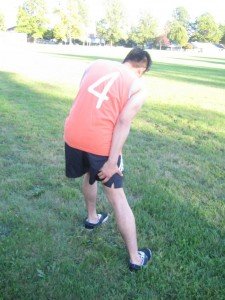Overtraining syndrome is a neuroendocrine ailment due to excessive training. If an individual is overtraining, he/she engages in high intensity training and limited rest periods that results to constant tiredness, diminished performance, mood swings, neural and hormonal changes as well as recurrent poor health.
Indications of overtraining syndrome
Always bear in mind that fatigue is the initial symptom that is evident. This is later followed by other symptoms such as:
- Reduced maximal heart rate
- Increased morning heart rate and blood pressure

Persistent soreness of the muscles is one of the indications of overtraining syndrome. - Persistent soreness of the muscles
- Weight loss
- Appetite loss
- Lack of motivation
- Experiencing frequent illnesses such as upper respiratory tract infections
- Irritability
- Disrupted sleep patterns
- Depression
Once further assessment is carried out, the following might be present:
- Hormonal changes
- Changes in the blood content
- Neuroendocrine changes
- Changes in the blood lactate threshold as well as the concentration at a particularly exercise intensity
Management
If an individual is suspected with overtraining syndrome, he/she must be closely monitored with a daily diary. This must include details about the stress levels, sleep quality, fatigue, training details, muscle soreness and potential degree of exertion during training.
The main point in recovering from overtraining syndrome as well as preventing its recurrence is proper knowledge on the importance of getting enough rest in the training cycle and the undesirable effects of strenuous training.
There should be a phase of complete rest for a brief period with sleep on the initial 48 hours. In less severe cases, this is usually enough to allow the symptoms to settle and re-invigorate the individual. As for complex cases, further rest is required along with relaxation techniques, close attention to dietary and fluid intake as well as psychological support.

